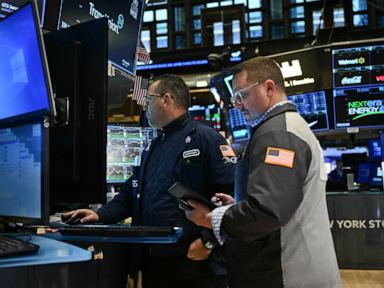If China shares AI, the US can't afford to lock it out

When the Chinese firm DeepSeek launched its latest AI model, shocking policymakers and bruising the stock market, it exposed a paradox: freely available software that parrots the Chinese Communist Party was made freely modifiable.
DeepSeek’s open-source models rival those from closed-source U.S. labs, and power a chatbot that is currently the most downloaded app globally. But they promote the One China policy, flatter Xi Jinping, and avoid talk of Uyghur genocide. The chairman of the House Select Committee on the Chinese Communist Party, arguing the new model is “controlled” by Beijing and “openly erases the [party's] history of atrocities,” called for stronger export controls.
His colleagues quickly obliged.
Within 48 hours, Sen. Josh Hawley (R-Mo.) had introduced a bill to prohibit the import and export of any AI “technology” to or from China, with penalties of 20 years' imprisonment. The bill would ban research projects — activities “directed toward fuller scientific knowledge” — with Chinese colleges or universities. And the broad definition of AI technology would capture not just chips but also data, research, software and the distinctive settings or “parameters” that determine a model’s performance.
These proposals are the most aggressive AI reforms contemplated by any policymaker, of either party, anywhere in the U.S. President Trump has blasted the Biden administration for imposing “onerous and unnecessary government control” over AI. Yet a ban on the import and export of intangible technology like models — digital files that can be shared on the Internet — would eclipse anything proposed by his predecessor, the European Union or the Republicans’ bête noire, California.
Bizarrely, the bill appears to prohibit simply downloading Chinese technology or intellectual property, barring U.S. developers from even studying models like DeepSeek’s, let alone learning from them. And since no one can reasonably prevent widely available software, data or research findings winding up in China, it would put the brakes on open science and open technology from the U.S. too. If they survive Congress and a robust First Amendment challenge, these ideas would smother open innovation — and foster a global reliance on Chinese technology in the process.
While Chinese developers are required by law to ensure their models “adhere to [the CCP’s] core socialist values,” it’s precisely because DeepSeek open-sourced their R1 model that researchers and developers can do something about it. Anyone can download and run the model independently of DeepSeek, probe it for undesirable behaviors, and modify it to improve performance — or unwind censorship.
Within a few days, developers had shared over 500 variations of the model online, earning five times as many downloads as the original. The AI search engine Perplexity has tweaked and deployed its own version of R1, which can summarize the Tiananmen Square Massacre and explain Taiwanese independence without the Orwellian admonitions of the original model.
By comparison, the largest models released by Open AI, Anthropic or Google are closed. Their distinctive parameters are withheld, accessible only through a paywalled interface like ChatGPT. In general, users and developers must take what they’re given, accepting the limitations imposed by a handful of Big Tech firms — including, to the chagrin of Republican policymakers, their political and cultural biases.
Asked about DeepSeek, artificial intelligence and crypto czar David Sacks argues that predominantly closed-source U.S. firms dropped the ball by focusing on content moderation instead of competition. “They wasted a lot of time on things like DEI and woke AI,” he said. “The models were basically producing things like black George Washington.”
All models embed the values and design choices of the labs that develop them, as well as biases in their training data and vulnerabilities in their architecture. But it’s difficult to reconcile these contradictions: policymakers fret about Beijing freeriding on U.S. industry and exporting ideology in open-source models, while blaming U.S. firms for censoring their black-box models. These comments reflect a wider tension in Washington over whether open technology is a boon for transparency and competition in AI, or a windfall for America’s adversaries. As Hawley wrote to Meta following the release of its open Llama model, “centralized AI models can be more effectively updated and controlled to prevent and respond to abuse.”
Yet because DeepSeek released its model openly, developers can look under the hood, modify its behaviors and substitute alternative values. That’s a good thing, since their R1 model appears to be equally capable, more efficient, cheaper to run and free to use compared to leading U.S. models. With these advantages, DeepSeek’s models could become the default “engines” that power the next generation of AI applications. That means there’s a real possibility that China-regulated and censored models might determine the search results or social media feeds of billions of people around the globe.
But open technology isn’t guaranteed. Like OpenAI before it, DeepSeek could choose to keep its future models behind a paywall — succumbing, perhaps, to commercial pressure or a regulatory crackdown in Beijing. If the world develops a reliance on closed-source Chinese models accessed through a paywall, we will inherit their warped behaviors too.
That is why the world needs a steady supply of competitive open-source alternatives that can be inspected, modified and localized.
The U.S. is an indispensable part of that supply chain: both directly, through our own open models (like Meta’s Llama), and indirectly, through chips, research, data and capital. There are risks. Open technology can be misused, and upstream firms may have little control over downstream development. But if the U.S. government turns off the tap, it will promote a global reliance on Chinese technology from labs regulated by the Chinese Communist Party. It will erode the influence of U.S. firms abroad, and displace U.S.-trained, U.S.-aligned and U.S.-regulated models from the world’s AI systems.
Instead of pulling up the drawbridge, the U.S. should commit to ensuring that powerful models remain openly available. Ubiquity is a matter of national security: retreating behind paywalls will leave a vacuum filled by strategic adversaries. Washington should treat open technology not as a vector for Chinese Communist Party propaganda but as a vessel to transmit U.S. influence abroad, molding the global ecosystem around U.S. industry.
If DeepSeek is China’s open-source “Sputnik moment,” we need a legislative environment that supports — not criminalizes — an American open-source Moon landing.
Ben Brooks is a fellow at Harvard’s Berkman Klein Center, and previously led public policy for Stability AI, developer of Stable Diffusion.
Topics
-

Arsenal can't afford to write off EFL Carabao Cup against Newcastle, as season's trophy opportunities dwindle
Despite facing a 2-0 deficit, the League Cup is one of Arsenal's last chances at a trophy this seasonCBS Sports - 2d -

The global AI race: Is China catching up to the US?
The release of DeepSeek’s new model has shaken assumptions about who has the upper hand in developing the technologyFinancial Times - 6d -

Nvidia, Microsoft shares tumble amid rise of China-based AI DeepSeek
DeepSeek chatbot tops Apple's app-store charts.ABC News - Jan. 27 -
Most Americans can't afford a $1,000 emergency expense, report finds
Nearly 60% of Americans don't have enough money put away to handle common financial emergencies, according to Bankrate.CBS News - Jan. 23 -

Huawei seeks to grab market share in AI chips from Nvidia in China
Tech giant pushes its artificial intelligence chips as hardware of choice for ‘inference’ tasksFinancial Times - Jan. 21 -

Men living with their mums longer as they can't afford to move out
Living with your parents in your 20s and 30s has its challenges, but many can't afford to move out.BBC News - Jan. 19 -
US imposes export controls on chips for AI to counter China
American semiconductor industry warns move will aid competitors while EU has also protested against the new rulesFinancial Times - Jan. 13 -

America can't afford to lose the high-skilled talent race in today's competitive markets
America’s real competitive edge lies in its people. If we fail to act, today’s political skirmishes will become tomorrow’s lost opportunities.The Hill - Jan. 11 -

'I changed jobs, work nights, and we still can't afford a home'
Struggling families say they can only dream of having their own home, as the BBC tracks government housebuilding targets.BBC News - Jan. 9
More from The Hill
-

EPA administrator, Trump special envoy join LA mayor to evaluate fire recovery
The Environmental Protection Agency Administrator Lee Zeldin, President Trump's envoy for special missions Richard Grenell, and other federal and state officials joined Los Angeles Mayor Karen Bass ...The Hill - 40m -

DeepSeek in crosshairs
Welcome to The Hill's Technology newsletter {beacon} Technology Technology The Big Story Lawmakers take aim at DeepSeek A bipartisan pair of lawmakers are introducing a measure to ban Chinese ...The Hill - 56m -

Jewish lawmakers form official House caucus for first time
Reps. Jerry Nadler (D-N.Y.) and Debbie Wasserman Schultz (D-Fla.) lauded the creation of the Congressional Jewish Caucus in a Thursday press release outlining an official forum for Jewish ...The Hill - 1h -

Judge halts Trump buyouts ahead of deadline
Welcome to The Hill's Business & Economy newsletter {beacon} View Online Business & Economy Business & Economy The Big Story Judge halts Trump federal worker buyouts plan A federal judge has just ...The Hill - 1h -

Trump administration slashing USAID workforce to fewer than 300 employees: Reports
The government's foremost foreign aid agency is being gutted. The U.S. Agency for International Development (USAID) workforce is being slashed from more than 10,000 employees to fewer than 300, ...The Hill - 1h
More in Politics
-

Health clinics face cuts, closures as Trump's funding fight ripples outside of Washington
In West Virginia, a nonprofit mental health program for teenage girls is turning to a private donor to help cover its expenses.NBC News - 8m -

Some migrants arrested in recent immigration crackdown have been released back into U.S.
Some people caught in Trump administration immigration operations have already been released back into the United States on a monitoring program.NBC News - 14m -
FBI agent involved in Jan. 6 probes says Trump review is 'demoralizing'
Another federal judge has blocked the Justice Department from releasing a list of FBI agents involved in investigating the Jan. 6 Capitol riot. Scott MacFarlane spoke to one of those agents, who ...CBS News - 29m -
Senate confirms Russ Vought to lead budget office as Democrats protest
The Senate voted Thursday to confirm Russ Vought to lead the Office of Management and Budget after Democrats held the floor overnight to oppose his confirmation.CBS News - 33m -

EPA administrator, Trump special envoy join LA mayor to evaluate fire recovery
The Environmental Protection Agency Administrator Lee Zeldin, President Trump's envoy for special missions Richard Grenell, and other federal and state officials joined Los Angeles Mayor Karen Bass ...The Hill - 40m